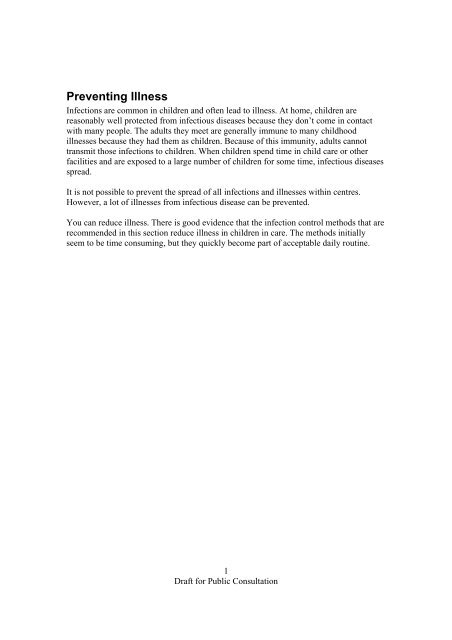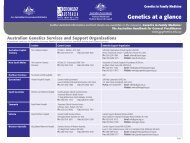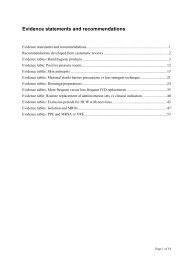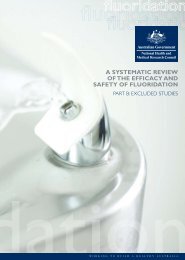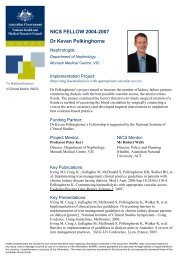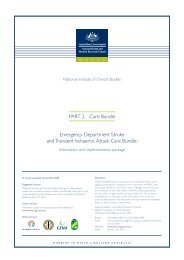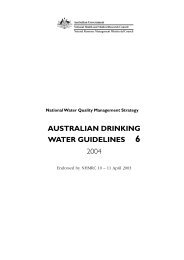- Page 1 and 2: Staying Healthy in Child Care Preve
- Page 3: Salmonella……………………
- Page 7 and 8: Blood Some infections are spread wh
- Page 9 and 10: • Encourage parents to tell you w
- Page 11 and 12: Sample report form for parent/docto
- Page 13 and 14: Responsibilities of parents • Com
- Page 15 and 16: Exclusion of sick children and staf
- Page 17 and 18: for 24 hours Campylobacter Exclude
- Page 19 and 20: Norovirus swelling goes down (which
- Page 21 and 22: Hand washing Infections can be spre
- Page 23 and 24: Cover your cough and stop the sprea
- Page 25 and 26: the paper and do not reach the tabl
- Page 27 and 28: Cleaning the centre Washing germs a
- Page 29 and 30: Wear gloves when handling soiled li
- Page 31 and 32: Dealing with spills of blood, faece
- Page 33 and 34: Sandpits Sandpits can be great fun.
- Page 35 and 36: Immunisation Childhood vaccination
- Page 37 and 38: antibiotic (neomycin). Reactions to
- Page 39 and 40: Meningococcal C immunisation A sing
- Page 41 and 42: Vaccine Key Hepatitis B Hepatitis B
- Page 43 and 44: Mumps - contagious virus spread by
- Page 45 and 46: Parent Advice Sheet Commonly observ
- Page 47 and 48: 23vPPV 23-valent pneumococcal polys
- Page 49 and 50: • Keep a non-mercury thermometer
- Page 51 and 52: Occupational Health and Safety for
- Page 53 and 54: Erythema infectiosum, also called p
- Page 55 and 56:
Part 2 Respiratory complaints Asthm
- Page 57 and 58:
Bronchiolitis Description Bronchiol
- Page 59 and 60:
Bronchitis Description Many childre
- Page 61 and 62:
Common cold Description The common
- Page 63 and 64:
Croup Description Croup is caused b
- Page 65 and 66:
Ear infections (otitis) Description
- Page 67 and 68:
Influenza Description Influenza is
- Page 69 and 70:
Pneumococcal disease Description Pn
- Page 71 and 72:
Runny noses (with green or yellow d
- Page 73 and 74:
Responsibilities of the parents Kee
- Page 75 and 76:
Treatment People with TB require an
- Page 77 and 78:
Controlling the spread of infection
- Page 79 and 80:
Controlling the spread of infection
- Page 81 and 82:
Make sure that effective hand washi
- Page 83 and 84:
with infectious diarrhoea should no
- Page 85 and 86:
Giardiasis Description Giardiasis i
- Page 87 and 88:
Norovirus Description Norovirus is
- Page 89 and 90:
Rotavirus Description Rotavirus is
- Page 91 and 92:
Salmonellosis Description Salmonell
- Page 93 and 94:
Shigellosis Description Shigellosis
- Page 95 and 96:
Worms: Pinworms Description There a
- Page 97 and 98:
Worms: Roundworm, hookworm and tape
- Page 99 and 100:
Chickenpox (varicella) Description
- Page 101 and 102:
Cold sores (herpes simplex) Descrip
- Page 103 and 104:
Parvovirus B19 (Erythema infectiosu
- Page 105 and 106:
Head lice (Pediculosis capitis) Des
- Page 107 and 108:
7. Comb each section twice until yo
- Page 109 and 110:
Measles Description Measles is a hi
- Page 111 and 112:
Molluscum contagiosum Description A
- Page 113 and 114:
Responsibilities of parents Observe
- Page 115 and 116:
Rubella (german measles) Descriptio
- Page 117 and 118:
Scabies and other mites causing ski
- Page 119 and 120:
Scarlet fever Description Scarlet f
- Page 121 and 122:
Thrush (candida) Description Thrush
- Page 123 and 124:
Treatment Warts will usually go awa
- Page 125 and 126:
Responsibilities of child care prov
- Page 127 and 128:
• not kissing infants on the mout
- Page 129 and 130:
Haemophilus influenzae type b (Hib)
- Page 131 and 132:
Hepatitis A Description Hepatitis A
- Page 133 and 134:
Hepatitis B Description Hepatitis B
- Page 135 and 136:
Hepatitis C Description Hepatitis C
- Page 137 and 138:
HIV (Human immunodeficiency virus),
- Page 139 and 140:
Meningococcal infection Description
- Page 141 and 142:
Mumps Description Mumps is an infec
- Page 143 and 144:
Viral Meningitis Description Viral
- Page 145 and 146:
the invading organisms. Immunoglobu
- Page 147 and 148:
Useful Web Sites (Taken from Health
- Page 149 and 150:
References 1 You’ve got what? 200
- Page 151 and 152:
38 Parenting and Child Health - Cro
- Page 153 and 154:
79 You’ve got what? 2004. Fifth d
- Page 155:
118 You’ve Got What? Meningococca


